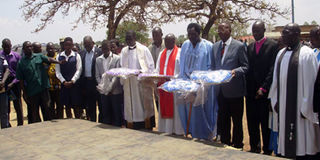Prime
LRA insurgency: More human remains recovered near Barlonyo memorial site

Remembered. Tourism minister Ephraim Kamuntu (3rd right) and area leaders lay wreaths on a monument erected in memory of the Barlonyo attack victims in Agweng Sub-county, Lira District in February. FILE PHOTO
Human remains believed to be victims of the Lord’s Resistance Army (LRA) insurgents’ raid on Barlonyo internally displaced people’s camp in Lira District have been recovered.
On February 21, 2004, more than 300 civilians were massacred by the LRA during a raid on the camp.
At the time of the attack, the camp, located in the present Agweng Sub-county, was housing 11,643 people.
Those killed were buried in a mass grave in the camp.
A total of 206 people, who were abducted during the attack, are still missing.
How they met their death
The former camp leader, Mr Moses Ogwang, while speaking during the 15th anniversary of Barlonyo memorial prayers on February 21, said 302 people were either shot dead or burnt to death when the rebels raided the camp.
The remains were discovered by casual workers who were sinking a pit-latrine near the former IDP camp last Tuesday.
The Agweng Sub-county chairman, Mr Marino Ogwang, confirmed to Daily Monitor that workers who were sinking a pit latrine at a site belonging to Pentecostal Assemblies of God mission dug out several human bones.
Mr Ogwang said when he was informed about the issue, he rushed to the scene and stopped the workers from continuing sinking the pit latrine.
“What I saw was several bones of people which had been dug out, but we could not tell the number of victims since this would only be possible if their skulls had been found,” he said last Friday.
Authorities and some LRA survivors said they believe the remains are for victims buried in a mass grave by unknown people after the attack on Barlonyo.
The North Kyoga region police spokesman, Mr David Ongom Mudong, however, said they were not aware of the new “mass grave” which had been discovered at Barlonyo.
“That matter was not reported to us because the information would have reached the regional headquarters, may be they reported to other authorities,” Mr Ongom told Daily Monitor early this week.


